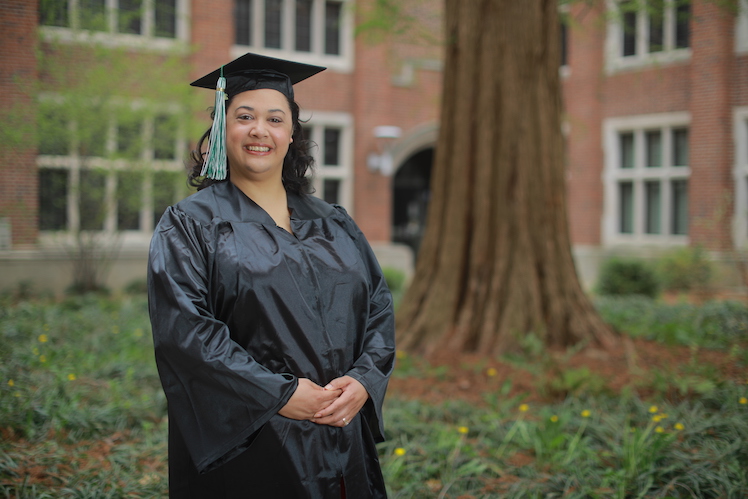Leah Williams’ next step is clear: she’s going to grad school.
“I just got notice that I was accepted into the MSW program at UToledo, so I can actually become, now, a renal social worker,” she said. “I wanted to work in transplant so I could help other people of color, like myself, obtain transplants.”
But that wasn’t always the case. When Williams transferred to The University of Toledo in 2015, she had a different path in mind. She still intended to pursue social work, but at the time she had planned to work with children and families. Life, however, redirected that path.
“I ended up taking time off of school to have a kidney transplant.”

CELEBRATING SUCCESS: UToledo recognizes the Class of 2021 with a series of stories featuring students receiving their degrees at spring commencement.
After recovering from her transplant at The University of Toledo Medical Center, Williams returned to school and refocused her undergraduate studies toward becoming a renal transplant social worker. She intends to work with African Americans and other people of color affected by kidney disease, helping them navigate the complicated journey toward a transplant.
“When I was on dialysis for two years, I noticed that in the dialysis centers, there were a lot of African American people and people of color there who either did not qualify for transplants or didn’t know how to qualify for transplants,” she said. “I made it my mission to go back to these centers and say ‘Look, this isn’t even about people of color. I just notice they are the most affected. They are overrepresented in chronic kidney disease and end-stage renal disease, because of a lot of preexisting conditions and other factors such as Type 2 diabetes and hypertension.”
Beyond simply navigating the transplant process, there is a great deal that goes into receiving a new organ. Social workers like Williams help patients — often older people — identify which services they may need after their transplant, in addition to helping them cope with what’s often a significant psychological load.

Leah Williams is graduating with her bachelor’s degree in social work and will continue her education at UToledo in the master of social work program.
“We help people essentially change their lives so they can have this life-saving gift and move forward with a better life,” Williams said. “We do assess them from the psychosocial perspective for transplants and their input is needed because every transplant is unique. There’s a counseling aspect to it, too, because when you do receive a gift of life, it’s usually from a deceased donor. And there’s often a sense of guilt or wonderment about what had happened to the person that gave you your gift.”
Williams hopes to work at a transplant center or dialysis center in the Toledo area, and she’s already well on her way, interning at The University of Toledo Medical Center. Her internship is just the latest iteration of what’s become a long relationship with the University, which helped Williams through the transplant process via Student Disability Services.
“That department is very great. They help me a lot every semester, always asking ‘Okay what do you need to do? What do you need us to do to support you?’ That’s always been their main focus,” she said. “Just every aspect, from using UTMC to receive my kidney transplant to working there now to finish my internship for my bachelor’s degree, the University has always been a very strong point in my life.”
And as she begins her next step, Williams plans to keep that mentality of helping others in mind. She received help during her undergraduate work, and now she plans to offer the same kind of help to others, both during and after her graduate studies.
“I have some connections to dialysis centers in the Toledo area, so I’m hoping I’ll be able to get in somewhere after graduation and be able to help people,” she said. “That’s my life. Helping people.”